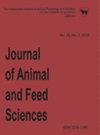Effect of cinnamon oil supplementation into broiler chicken diets on growth, carcass traits, haemato-biochemical parameters, immune function, antioxidant status and caecal microbial count
IF 1.5
4区 农林科学
Q3 AGRICULTURE, DAIRY & ANIMAL SCIENCE
引用次数: 6
Abstract
Subtherapeutic antibiotics have been used extensively as growth promoters in poultry production to enhance growth performance, treating and improving the immunity of sick and sensitive birds. However, the overuse of antibiotics has resulted in the development of antibiotic-resistant bacterium strains that may be transmitted from animals to humans (Anthony et al., 2010). The use of antibiotics as growth promoters was thus completely banned by the European Union in 2006 due to its adverse effects on human health. So, it is important to search for alternative growth promoters to avoid the negative effects and consequences of using such antibiotics. Many studies have been conducted to investigate the use of plants, plant extracts and oils as effective substitutes for antibiotics. In poultry diets, herbs and herbal products are used to replace synthetic and chemical products (Alagawany et al., 2020). Because of their antimiABSTRACT. This study aims to investigate the effect of supplementing dietary cinnamon oil (CO) into broiler chicken diets on growth performance, carcass traits, haemato-biochemical parameters, immune function, antioxidant status, and caecal microbial count. Three hundred one-day old broilers were distributed randomly, with 5 replications, into 5 groups (12 birds per replicate). Dietary treatments comprised the basal diet (control group), and the basal diet supplemented by either 10 mg/kg avilamycin or 500, 1000 and 1500 mg/kg of CO. Results indicated that birds from CO-treated groups had higher body weight, weight gain and feed conversion ratio than the control group. Also, birds from CO supplemented groups had lower total cholesterol, triglycerides, lowdensity lipoproteins than those from the control group; the lowest values were recorded in the group treated with 500 mg/kg CO. Treatment with CO increased the relative weight of spleen, thymus, bursa of Fabricius and plasma content of IgM when compared to the control and the antibiotic-treated groups. In chickens fed CO a significant decrease in caecal total microbial count, total yeast and mold count, Escherichia coli, and Salmonella was noted in comparison with the control group but was similar to animals from antibiotic-treated group. The count of lactic acid bacteria increased in the caecum of chickens fed CO in comparison with those from the control group; the lowest level was observed in the antibiotic group. So, CO can be used in broiler chicken diets as a natural alternative to antibiotic growth promoters to improve gut health and consequently growth performance. Received: 26 September 2021 Revised: 15 November 2021 Accepted: 24 February 2022饲粮中添加肉桂油对肉鸡生长、胴体性状、血液生化指标、免疫功能、抗氧化状态和盲肠微生物数量的影响
亚治疗抗生素已被广泛用作家禽生产中的生长促进剂,以提高生长性能,治疗和提高病禽和敏感禽的免疫力。然而,抗生素的过度使用导致了抗生素耐药性菌株的发展,这些菌株可能从动物传播给人类(Anthony等人,2010)。因此,由于抗生素对人类健康的不利影响,欧盟于2006年完全禁止使用抗生素作为生长促进剂。因此,寻找替代生长促进剂以避免使用此类抗生素的负面影响和后果是很重要的。已经进行了许多研究来调查植物、植物提取物和油作为抗生素的有效替代品的用途。在家禽饮食中,草药和草药产品被用来取代合成和化学产品(Alagawany等人,2020)。因为他们的反iABSTRACT。本研究旨在研究日粮中添加肉桂油(CO)对肉鸡生长性能、胴体性状、血液生化参数、免疫功能、抗氧化状态和盲肠微生物计数的影响。将300只一日龄肉鸡随机分为5组(每重复12只),共5次。日粮处理包括基础日粮(对照组)和补充10 mg/kg阿维拉霉素或500、1000和1500 mg/kg CO的基础日粮。结果表明,CO处理组的鸟类比对照组具有更高的体重、增重和饲料转化率。此外,CO补充组的鸟类总胆固醇、甘油三酯和低密度脂蛋白低于对照组;与对照组和抗生素处理组相比,用500 mg/kg CO处理的组中记录的值最低。用CO处理增加了脾脏、胸腺、法氏囊的相对重量和IgM的血浆含量。与对照组相比,喂食CO的鸡盲肠总微生物计数、总酵母和霉菌计数、大肠杆菌和沙门氏菌显著下降,但与抗生素治疗组的动物相似。与对照组相比,饲喂CO的鸡盲肠中乳酸菌计数增加;抗生素组最低。因此,CO可以作为抗生素生长促进剂的天然替代品用于肉鸡日粮中,以改善肠道健康,从而提高生长性能。接收日期:2021年9月26日修订日期:2021月15日接受日期:2022年2月24日
本文章由计算机程序翻译,如有差异,请以英文原文为准。
求助全文
约1分钟内获得全文
求助全文
来源期刊

Journal of Animal and Feed Sciences
农林科学-奶制品与动物科学
CiteScore
2.10
自引率
0.00%
发文量
42
审稿时长
3 months
期刊介绍:
Journal of Animal and Feed Sciences (JAFS, J. Anim. Feed Sci.) has been published by the Kielanowski Institute of Animal Physiology and Nutrition, Polish Academy of Sciences in Jabłonna (Poland) since 1991. It is a continuation of the Polish-language journal Roczniki Nauk Rolniczych. Seria B, Zootechniczna published by the Polish Academy of Sciences since 1969.
JAFS is an international scientific journal published quarterly, about 40 papers per year including original papers, short communications and occasionally reviews. All papers are peer-reviewed and related to basic and applied researches in the field of animal breeding and genetics, physiology of nutrition, animal feeding, feed technology and food preservation. The journal distinguishes the multidisciplinary nature of physiological and nutritional sciences and so includes papers specialized in all fields connected with animal well-being, including molecular and cell biology and the emerging area of genetics.
 求助内容:
求助内容: 应助结果提醒方式:
应助结果提醒方式:


